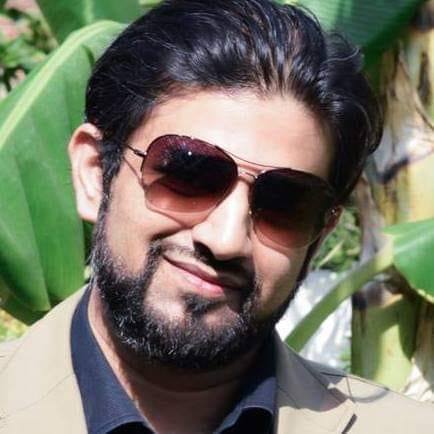
Issue of Fadak

Issue of Fadak
This is also a hotly debated topic between Shias and Sunnis. The Shia say that Abu Bakr (RA) made Sayyidah Fatima (RA) angry by not giving land of Fadak to her, as the land was her inherited right and a gift from Prophet (Peace be upon him).
Let us now look at hadiths from Sunni literature that are misused.
Narrated `Aisha:
Fatima the daughter of the Prophet (ﷺ) sent someone to Abu Bakr (when he was a caliph), asking for her inheritance of what Allah's Messenger (ﷺ) had left of the property bestowed on him by Allah from the Fai (i.e. booty gained without fighting) in Medina, and Fadak, and what remained of the Khumus of the Khaibar booty. On that, Abu Bakr said, "Allah's Messenger (ﷺ) said, "Our property is not inherited. Whatever we leave, is Sadaqa, but the family of (the Prophet) Muhammad can eat of this property.' By Allah, I will not make any change in the state of the Sadaqa of Allah's Messenger (ﷺ) and will leave it as it was during the lifetime of Allah's Messenger (ﷺ), and will dispose of it as Allah's Messenger (ﷺ) used to do." So Abu Bakr refused to give anything of that to Fatima. So she became angry with Abu Bakr and kept away from him, and did not talk to him till she died. She remained alive for six months after the death of the Prophet. When she died, her husband `Ali, buried her at night without informing Abu Bakr and he said the funeral prayer by himself. When Fatima was alive, the people used to respect `Ali much, but after her death, `Ali noticed a change in the people's attitude towards him. So `Ali sought reconciliation with Abu Bakr and gave him an oath of allegiance. `Ali had not given the oath of allegiance during those months (i.e. the period between the Prophet's death and Fatima's death)…. [Sahih Bukhari Vol. 5, Book 59, Hadith 546. Also see: Bukhari, Volume 4, Book 53, Hadith 325]
The wordings: “So she became angry with Abu Bakr and kept away from him, and did not talk to him till she died”
and
“So `Ali sought reconciliation with Abu Bakr and gave him an oath of allegiance. `Ali had not given the oath of allegiance during those months (i.e. the period between the Prophet's death and Fatima's death)”
Are not actual wordings of narration but an “IDRAAJ (INTERPOLATION)” by Ibn Shihab al- Zuhri (a sub narrator). All such hadiths which create rift between Abu Bakr, Fatima, and Ali have come only from al- Zuhri. According to author’s research al- Zuhri has also narrated some other troublesome hadiths that create rift between Sunnis and Shias.
In one hadith coming from same Ibn Shihaab al- Zuhri [Sahih Muslim Hadith # 4354] the Arabic suddenly changes from feminine to masculine and word “قَالَ” is used which means “HE SAID.” Remember the hadith is narrated by Sayyidah Aisha (ra) who was a woman then how come suddenly word “QAALA” has come in between? This proves that it is an Idraj and not original wording of hadith. It is impossible for al- Zuhri to be present at that incident.
Before we refute al- Zuhri’s interpolations, let us see another hadith from Sahih Bukhari
Vol. 5, Book 57, Hadith 61: (Sahih Bukhari)
Allah's Messenger (ﷺ) said, "Fatima is a part of me, and he who makes her angry, makes me angry."
Hence, Fatima (RA) becoming angry with Abu Bakt (RA) would put Abu Bakr (RA) in hot waters. However longer hadiths prove the context to be regarding Ali (RA) when he wanted to marry daughter of Abu Jahl and then Prophet (Peace be upon him) said this in regards to Ali (RA)
The answer to the former hadith we showed is that Ibn Shihab al- Zuhri was renowned for adding his own words in hadiths (i.e. doing Idraj). Hadith specialists of the past had refuted him and asked him to clarify whenever he makes Idraj (which he has not done in the former hadith).
The hadith mentioning anger of Sayyidah Fatima with Abu Bakr has only come from Ibn Shihab al Zuhri, hence the Idraj is rejected. Other Sahaba have also narrated this hadith but none of them mentions Sayyidah Fatima (ra) getting angry with Abu Bakr (RA).
Imam al- Sakhawi (rah) said: Ibn Shihab al- Zuhri used to (himself) explain many hadiths, many times he would not mention the particle [of speech] from which would be known if the words were from the Prophet (Peace be upon him) or from Zuhri himself. Hence some (scholars) of his time would always ask him to separate his words from those of the Prophet (Peace be upon him). [Sakhawi, Fath -al- Mughees, 1/267, 268)]
Imam al- Bayhaqi after narrating this hadith said:
وقول الزهري في قعود علي عن بيعة أبي بكر رضي الله عنه حتى توفيت فاطمة رضي الله عنها منقطع
Translation: This part that Ali abstained from giving pledge to Abu Bakr till Fatima died, is saying of al- Zuhri and it is broken (munqata) [Sunnan Bayhaqi al- Kubra 6/300, Hadith # 12732]
In Tadrib al Ravi of Imam Jalal ud din as- Suyuti (1/205) it states: Yahya bin Ma’een and Yahya al Qattan said: Zuhri’s Maraseel (missing link to next narrator) are “NOTHING”
There is no way al- Zuhri was present with Sahaba at that time, hence this interpolation of al- Zuhri will be counted as Mursal and thus rejected.
There are actually Sahih hadiths which prove that Sayyidah Fatima (RA) accepted the viewpoint of Abu Bakr (RA) and was satisfied with him.
It states in Sunnan al- Bayhaqi:
أخبرنا أبو عبد الله الحافظ ثنا أبو عبد الله محمد بن يعقوب الحافظ ثنا محمد بن عبد الوهاب ثنا عبدان بن عثمان العتكي بنيسابور ثنا أبو ضمرة عن إسماعيل بن أبي خالد عن الشعبي قال لما مرضت فاطمة رضي الله عنها أتاها أبو بكر الصديق رضي الله عنه فاستأذن عليها فقال علي رضي الله عنه يا فاطمة هذا أبو بكر يستأذن عليك فقالت أتحب أن آذن له قال نعم فأذنت له فدخل عليها يترضاها وقال والله ما تركت الدار والمال والأهل والعشيرة إلا ابتغاء مرضاة الله ومرضاة رسوله ومرضاتكم أهل البيت ثم ترضاها حتى رضيت هذا مرسل حسن بإسناد صحيح
Translation: When Sayyidah Fatima (RA) became ill, Abu Bakr (RA) visited her and asked for permission to enter. Ali (RA) said: O Fatima, here is Abu Bakr asking for permission to enter.’ She answered: Do you want me to give him permission? He said: Yes! So she allowed Abu Bakr to enter. Abu Bakr came in seeking her pleasure and said to her: By Allah, I only left my house, my property, and my family in order to seek pleasure of Allah, His Prophet, and you “O PEOPLE OF HOUSEHOLD (AHL-AL-BAYT). He continued talking to her until she was pleased with him. – (This hadith is good and Mursal and it has Sahih chain) [Sunnan al- Bayhaqi al- Kubra (6/301, Narration # 12515]
Even in Shi’ite literature it is proven that Sayyidah Fatima (RA) became pleased with Abu Bakr (ra)
Ibn Mitham al Buhrani in Sharh Nahjul Balagha 5/107 narrates: Abu Bakr said: The right of Prophet and you O Sayyidah Fatima is same: From wealth of Fai the Prophet used to separate for his family and wives, whereas remaining he used to spend in charity. I make you witness that just like Prophet used to do I WILL DO THE SAME, THEN SAYYIDAH FATIMA BECAME PLEASED WITH ABU BAKR AND TOOK OATH FROM ABU BAKR THAT HE WILL DISTRIBUTE IT LIKE THIS, ON WHICH ABU BAKR AGREED.
Many authentic books of Shias say that Fatima (RA) became pleased with Abu Bakr (RA), see: Sharh Usool al- Kaafi by Muhammad Salih Mazandani (11/400, Published from Qom, Iran), another by Murtadha al Askari Ma’lim (2/131), Mawaqif ul Shia bin Ali bin Hussain (3/110). They narrate: When Abu Bakr (ra) came and took an oath that he saw with his eyes that Prophet used to distribute the Amwaal of Fai to orphans, Sayyidah Fatima said: O Abu Bakr I will also do same as my father used to do. On this Abu Bakr said: I take an oath that I being trustee of Ummah will distribute it just like your father used to do. Fatima said: By God Abu Bakr will you do the same? Abu Bakr said: By God I will do it. Sayyidah Fatima said: O ALLAH BECOME WITNESS THAT I HAVE BECOME PLEASED WITH ABU BAKR.
These narrations prove that Sayyidah Fatima (RA) did not get angry with Abu Bakr (RA) till she passed away, rather she was pleased with him before her death.
There is another hadith which Shia use. It states:
Narrated Abu Hurairah: That Fatimah came to Abu Bakr and 'Umar may Allah be pleased with them both, to ask them about her inheritance from the Messenger of Allah (ﷺ). They said: "We heard the Messenger of Allah (ﷺ) say: 'I am not inherited from.'" So she said: 'By Allah! I will never talk to you two again.' So she died having not talked to them."
'Ali bin 'Eisa said: "The meaning of not speaking to you two is: 'Never again regarding this inheritance, because you two are truthful.'"[Jami’ at- Tirmidhi Vol. 3, Book 19, Hadith 1609]
Ali bin Esa is Munfarad (lone) narrator in this hadith though this hadith comes from other routes too but none of them mentions that She did not talk to the two again till she died. In the above hadith Ali bin Esa himself explained that she never talked to them about inheritance and considered them truthful.
Let us now look at hadith in Musnad Ahmed which states:
حدثنا عبد الله حدثني أبي ثنا عبد الوهاب بن عطاء قال أخبرنا محمد بن عمرو عن أبي سلمة عن أبي هريرة أن فاطمة رضي الله عنها جاءت أبا بكر وعمر رضي الله عنهما تطلب ميراثها من رسول الله صلى الله عليه و سلم فقالا إنا سمعنا رسول الله صلى الله عليه و سلم يقول إني لا أورث
[Musnad Ahmed bin Hanbal, 1/13, Hadith # 79]
Shaykh Shu’ayb al- Arn’aoot declared it “Hasan (Good)” [ibid]
This chain is shorter than the chain in Tirmidhi and shorter the chain the more authentic it is. Plus it contains same narrators except Ali bin Esa. There is no mention of Sayyidah Fatima not talking to them. Therefore in the hadith of at- Tirmidhi Ali bin Esa is Munfarad (alone).
In order to understand the issue of Fadak we need to know that resources in Islamic Shariah are three:
1. Sadaqat including Zakaat (i.e. charities)
2. Ghaneemat i.e. war booty.
3. Amwaal of Fai i.e. wealth or property which comes under control without war.
Fadak was from Amwaal of Fai. When Khayber was won then the Jews gave some proposals which Prophet accepted. Fadak came into Prophet’s possession without war.
Quran states: And what Allah restored [of property] to His Messenger from them - you did not spur for it [in an expedition] any horses or camels, but Allah gives His messengers power over whom He wills, and Allah is over all things competent. [Sahih International: 59:6 to10]
Inheritance is only on that wealth/property which is personal not on Fai. Head of the state cannot transfer such properties to his children or relatives.
In the hadith of Bukhari two words are to be noted: Sayyidah Fatima asked for “INHERTIANCE” and the second word is “FAI” these 2 are contradicting words because inheritance and Fai are different. Fai cannot be given to children.
The narrations in Shia books that Fadak was given as Hiba (gift) to Sayyidah Fatima, such reports have these following narrators:
1. Muhammad bin Abdullah bin Zubayr
The Sunni scholars of al- Jarh wa’t Ta’deel said the following about him
Imam al Ajli said: He is Kufi and Shia.
Ibn Hajr al Asqalani said in Tahdheeb, he is Kufi Shia.
Imam Yahya bin Ma’een said he was Ghaali (extremist) Shia.
Now let us see what Shia big authority of hadith sciences say of him:
Al Mamikani a Shia scholar said: He was shia but “MUJHOOL UL HAAL (UNKNOWN)” he also said I could not find a person with this name in Shia or Sunni books
2. Fudhayl bin Marzuq
3. Numayri bin Hasaan.
All these three are Shia narrators and one is unknown even according to Shias therefore the hadith of Fadak being a gift to Fatima even in Shia books is to be rejected according to Shia principles.
It can be said that Imam Suyuti a Sunni scholar has narrated this report in Dur ul Munthur, but after checking Dur ul Munthoor we see that the narration is chainless and hence not acceptable.
Imam al Haythami narrated it with Sanad but chain has Atiya al Awfi who is “MATROOK (DISCARDED)” Imam Azdi said he is Kufi and Munkar ul Hadith (denounced in hadith).
It is proven from Sunni books of hadith that Abu Bakr (ra) led the funeral of Sayyidah Fatima.
It is narrated by Imam Jafar (a.s) from Imam Baqir (a.s) that at the death of Fatima (a.s) Abu Bakr (ra) and Umar (ra) went to pray, Abu Bakr asked Ali (ra) to lead the prayer, Mawla Ali said: I will not lead the prayer as you are the Caliph of the Messenger of Allah (Peace be upon him), so Sayyiduna Abu Bakr went ahead and led the prayer. [Imam al- Hindi in Kanz ul Umaal (6/318)]
Also:
صلى أبو بكر رضي الله عنه على فاطمة بنت رسول الله فكبر عليها أربعًا
Hammad narrates from Ibrahim al- Nakhai’ that Sayyiduna Abu Bakr (r.a) prayed over Sayyidah Fatima Bint Rasool Allah (a.s) with four Takbirs [Ibn Sa’d in his Tabqaat, Volume # 8, Page # 16]
Shia would call these reports about Janazah weak, however they are narrated from different chains as shown above.
Reconciliation: Fadak was from Amwaal of Fai and they are not given in inheritance. The Prophets only leave behind knowledge as inheritance and not wealth or properties.
It is narrated in Shia book of hadith called Usool al- Kafi: Abu Abdillah (Imam Jafar as- Sadiq) says that the Prophet (Peace be upon him) said: “... And the scholars are the heirs of the Prophets; and the Prophets did not leave dinars and dirhams as inheritance; but they left knowledge. Therefore whosoever takes knowledge has taken a great portion.” (al- Kafi 1/42)
Regarding the authenticity of this hadith, Allama Muhammad Baqir al- Majlisi states in his commentary on al- Kafi, entitled Mir’at al- ‘Uqul:
[This] hadith has two chains of narration. The first is majhul [contains an unknown narrator], and the second is good or muwaththaq. [Together] they do not fall short of being authentic. (Mir’at al- Uqul, 1/111)
In al- Kafi, al- Kulayni has included a chapter entitled “Women do not inherit land”. In this chapter he narrates a hadith from Imam Muhammad al- Baqir, “Women do not inherit anything of land or fixed property.” (al- Kafi, vol. 7 p. 127 , Kitab al- Mawarith, hadith no.1 )
Al- Tusi in Tahdhib al- Ahkam, and al- Majlisi in Bihar al- Anwar have narrated from Maysarah that he asked Imam Jafar as- Sadiq about what a woman inherits. The Imam replied: “They will get the value of the bricks, the building, the wood and the bamboo. As for the land and the fixed property, they will get no inheritance from that.” (Tahdhib al- Ahkam, vol. 9 p. 299 ;Bihar al- Anwar, vol. 104 p.351 )
Note: The above 2 narrations are about wives. However Shia claim that according to general verses of Qur’an all women whether daughters or wives should inherit.
Logically speaking, Sayyidah Fatima (RA) was an extremely pious woman and according to Sunnis and Shias she is leader of women in paradise. It is not possible that she argued and got angry on a piece of land like we ordinary beings do nowadays.


